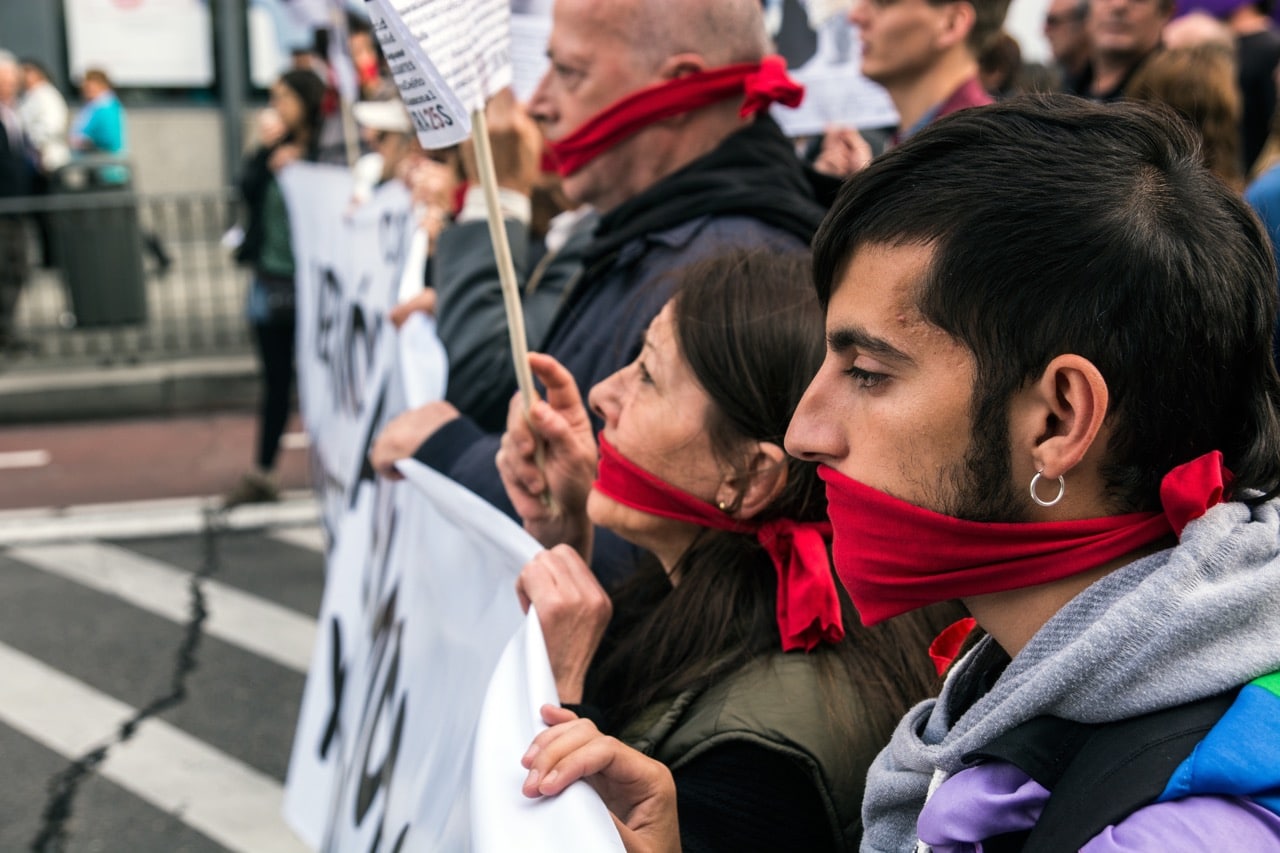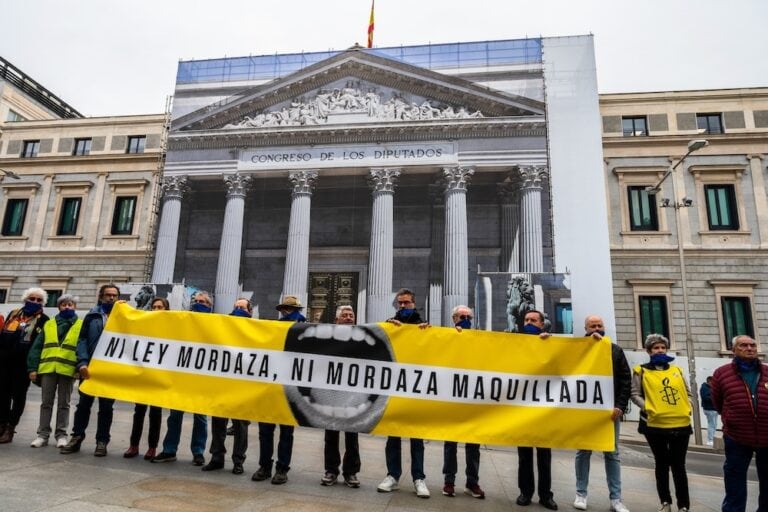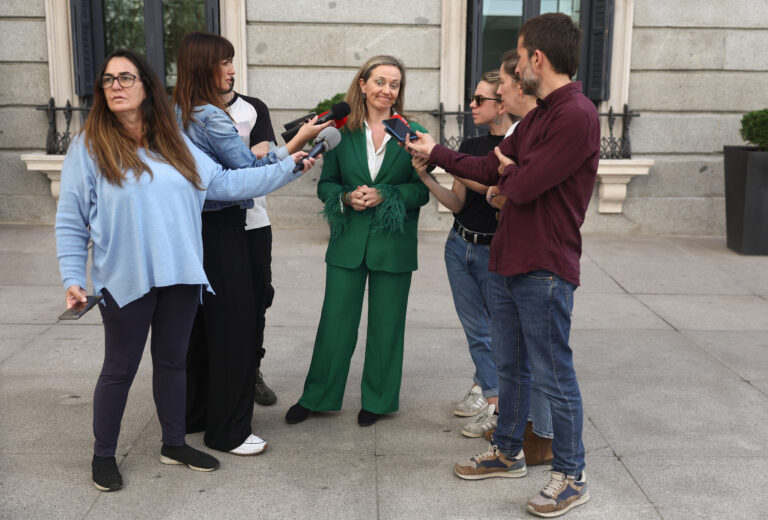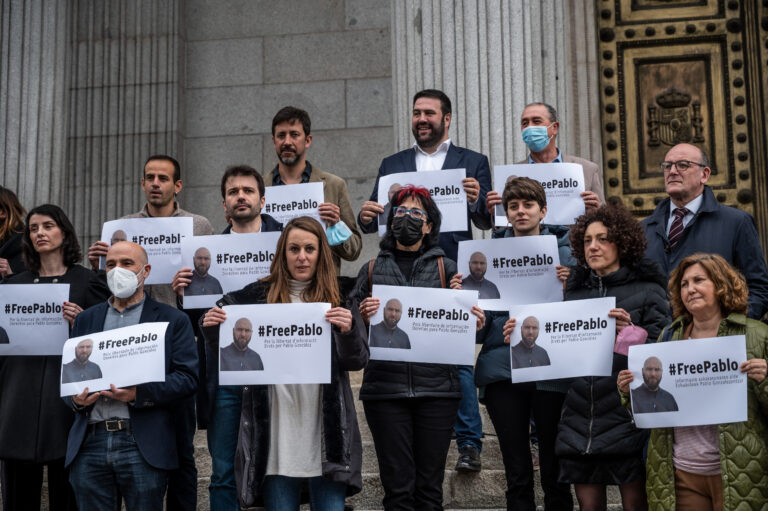Spain's 'gag law' was used to fine journalists while rappers and Twitter users were prosecuted.
This statement was originally published on ipi.media on 30 January 2018.
For the Platform in Defence of Free Expression (PDLI), 2017 was a very bad year for freedom of expression, in particular due to the terrorism convictions of individuals who have no links to violent activity and who were instead charged on the basis of opinions expressed on social networks or for their artistic expression in poems or songs.
2017 saw the first Twitter user in Spain head to prison for writing an opinion on social media. Also sentenced to jail were the leader of the band Def con Dos, César Strawberry; the Twitter user Cassandra; the rapper Valtonyc; and the collective La Insurgencia.
“It is hard to find in Spain’s recent democratic history a similar precedent for the degree of repression against free expression that we saw in 2017: people have been sent to jail for songs and tweets. We had forgotten this and it happened in the middle of Europe in the 21st century. The fact that we are taking so long to process this development is very serious,” PDLI President Virginia Pérez Alonso said.
Due to the flood of legal cases against Twitter users and artists in Spain’s Audiencia Nacional – a special court dedicated to hearing terrorism and drug-smuggling cases – PDLI has branded 2017 “the year of crimes of opinion”.
And it’s not just because of the convictions for alleged glorification of terrorism: in February prosecutors in Las Palmas opened proceedings against the drag artist Drag Sethlas for possible offence to religion – precisely in the same year in which a United Nations special rapporteur called for the repeal of all anti-blasphemy laws still in force around the world.
Furthermore, in 2017 the police continued to fine journalists despite an opinion from Spain’s national human rights ombudswoman, prompted by a complaint from PDLI, that the sanctions do not conform to constitutional requirements.
Meanwhile, in Spain’s congress, the repeal of the “gag law” has stalled. Lawmakers are currently debating two distinct bills (from the Spanish Socialist Party [PSOE] and the Basque National Party [PNV]) that threaten to “change everything so that everything stays the same”.
Positive news
Out of the year’s positive news, PDLI highlights the reform of Spain’s public broadcaster, RTVE, to restore the independence of its president; the ruling of Supreme Court Judge Luciano Varela clarifying the criteria on when an opinion expressed in social media can be considered a crime; the decision of the European Parliament calling on states to regulate the protection of whistleblowers; and Spain’s rejection of extradition requests from Turkish President Erdoğan against two Turkish journalists following an intense campaign by PDLI.
PDLI’s work also had an impact on the withdrawal by the Madrid regional government of a bill on “Equal treatment and protection against acts of incitement to hate, discrimination and intolerance”, which PDLI considered a “judicial aberration” for proposing to regulate free expression through administrative means and without judicial oversight. The bill foresaw fines of up to 45,000 euros for messages on social media.
The Podemos party also revised its bill “against discrimination based on sexual orientation” to eliminate parts of the text that harmed free expression, as PDLI previously reported.
In May, PDLI received the free expression award given by the Unió de Periodistes; PDLI President Virginia Pérez Alonso and Ignacio Escolar – editor of Eldiario.es, a founding media outlet of PDLI – were nominated for the José Couso awards and PDLI’s legal advisers, Carlos Sánchez Almeida and David Bravo, were nominated for the awards given by the “Hay Derecho” foundation for their defence of freedoms. The PDLI also attended an international conference in Doha in which it spoke out against the decline of freedom of expression around the world.
2017 also saw public demand for, and the consensus of media, journalists and organisations in support of, responsible journalism. The principles on responsible journalism published by PDLI in September 2017 and relaunched in October amid the conflict in Catalonia have been signed by more than 200 media outlets and journalists, including 20 Minutos, eldiario.es, Público, Voz Pópuli, Civio, the Federation of Journalist Unions (FeSP), the RTVE News Council, the Professional Association of Galician Journalists, the Association of Communication Users and the National Association of Photojournalists in the Press and Television.
10 Things to Know:
1. Twitter users and singers head to prison
“Prosecutors are seeking to jail me for 2 years and 6 months plus three years of supervised release for Carrero Blanco jokes. That’s it, jokes about a dictator.” 2017 began, with regards to free expression, with this tweet from the young Murcian woman Cassandra Vera on Jan. 10.
“From a reading of the impugned tweets it can be concluded that there was no crime,” PDLI’s legal director, Carlos Sánchez Almeida, stated at the time. However, the Audiencia Nacional eventually sentenced Cassandra to one year in prison and a seven-year ban on public-sector employment.
Also in January, the Supreme Court published its ruling sentencing César Strawberry to one year in jail.
“It sets a serious precedent regarding the protection of free expression in Spain,” Joan Barata, PDLI’s international law expert, concluded of the Strawberry ruling.
The first case in which courts applied the “Strawberry doctrine” was that of rapper Valtonyc, who was sentenced to three-and-a-half years behind bars in February 2017 for the content of his songs.
The last conviction of the year for a crime of opinion was for the hip-hop collective La Insurgencia: its 12 members were sentenced to two years and one day in prison, a fine of 4,800 euros and a nine-year ban on public-sector employment, on the basis of an “abstract risk” of new attacks. One judge, Ángela Murillo, dissented from the ruling.
Record number of cases in the Audiencia Nacional
Last month, the Audiencia Nacional was the subject of alarm due to a record number of cases involving “glorification” of terrorism on social media. In order to avoid stiffer penalties, four of the defendants reached an agreement with prosecutors and accepted sentences of two years in prison and an eight-year ban on public-sector employment.
A Spanish lawyer who did not accept the agreement, Arkaitz Terrón, said during the proceedings that “police investigations had been opened against an account with some 22 followers, involving tweets some four years old”. Terrón also stated that there was a lack of clarity regarding the criteria that experts used to target specific accounts for investigation given the volume of content on the web.
On Saturday, Nov. 4, 2017, a Spanish man named Alfredo Remírez entered prison over comments he made on social media. Remírez was the first of several Twitter users detained as part of the so-called “operaciones arañas” to serve a jail sentence. The “operaciones arañas” (literally: spider operations) refer to a string of detentions that the PDLI considers highly irregular, given that they were the result of a police fishing expedition in which investigators trawled through social media – an unacceptable approach in a democratic society.
The number of court cases related to “glorification of terrorism” has actually increased since the end of terrorist activity in Spain. Since the end of ETA and since the PP’s entry into government, the figure has increased fivefold. In 2011, the year in which ETA permanently renounced armed activity, there were four convictions under Art. 578. The count rose from 10 in 2012 to 15 in 2013, before stabilising at 14 in 2014. It rose again in 2015 to 25. Additionally, since Jan. 1, 2016, the Audiencia Nacional (a special court dedicated to crimes related to terrorism and drug trafficking) has convicted at least 30 individuals of “glorifying” terrorism in relation to ETA and/or GRAPO on social media.
2. Fines under the ‘gag law’ are raking in cash
In 2017 the police continued to fine journalists under the “gag law”, which in June marked two years since its entry into force. Cases included that of Mikael Sáenz de Buruaga of the Basque radio broadcaster Hala Bedi, singled out by the Ertzaintza amid “punching and pushing” on May 18 for recording with his mobile phone during a police operation in the Errekaleor neighbourhood of Vitoria despite showing his press credentials. Spain’s human rights ombudsman initiated proceedings regarding this case following a complaint submitted by PDLI.
Other cases include: journalist Cristina Fallarás was fined 600 euros when she participated in a protest against the murders of journalists in Mexico; the Association of Galician Journalists reported police threats to journalists covering an eviction in Santiago de Compostela; and Raúl Solís was the first journalist in Seville fined under the “gag law” when he was cited while working to cover a protest against a bus belonging to ultra conservative group Hazte Oír.
According to the report “Proceedings related to the protection of public safety 2016” published in May 2017 by the Interior Ministry, since the Law on the Protection of Public Safety took effect a total of 285,919 fines have been imposed with a total amount of 131,470,206 euros.
Measured by number of sanctions, alleged infractions of Art. 37.4 of the law on “lack of respect and consideration” for members of public security forces tripled in 2016: that year, 19,497 fines were imposed on the basis of that article with a total sum of 3,006,761 euros, compared to “only” 3,130 fines during the second half of 2015.
There were 12,094 fines on the basis of the articles on “disobedience or resistance to authority”, “refusal to identify oneself” or the provision of “false or inexact information in the process of identification” (Art. 36.6 of the law) in 2016, one-third more than in 2015, when there were 4,311 fines during the six-month period in which the law was in force. That is to say, in 2016 the police fined an average of 33 persons per day under these provisions.
The grand sum of these fines amounts to 10,196,817 euros.
PDLI delivered to Congress a report on the law calling on all political parties to adopt measures to prevent police actions against journalists while the law remains on the books and/or while it is in the process of being repealed.



